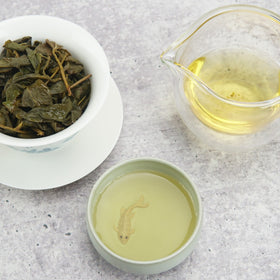
The Teagirl of Hummingbird Lane
In the Tea Girl of Hummingbird Lane, New York Times best selling novelist, Lisa See, pairs an epic Chinese tale of tragedy and triumph with one of the most intriguing type of tea, puerh. Even if you are not a tea drinker the story is compelling; but if you are one, then the pleasure of this book is definitely multi-layered.
Puerh, a tea from Yunnan province of China, is one of the oldest forms of tea. It comes in a compact form and its flavors improve with age. Recent discovery of tea leaves in the tomb of 2nd century BC Jing Emperor, Liu Qi - the oldest extant tea - is believed to be puerh. However, this unique tea was lost literally in the jungles of Yunnan until in the 1980s when tea connoisseurs from Taiwan tracked it down and engineered its revival with the help of local tea makers.

The novel opens in the remote Spring Well village inhabited by the Akha tribe just before the onset of the puerh revival. Li-yan, a young girl, and her family pick tea all day long starting from the break of dawn. It is a hard life with meagre earnings. The tea itself is generic and cheap. And it is not puerh that they make. Their lives are ruled by spirits, where not much happens without the oversight of the ruma and nima, the spirit priest and shaman.
When Huang Benyu, a wealthy tea connoisseur from Hong Kong, arrive at Spring Well looking for puerh, the villagers have no idea what he is talking about. They are shocked at how much Huang is willing to offer for their tea, especially the ones from old tea trees growing wild in the forest. The latter had thus far been considered inferior by the hill tribes.

The revival of puerh predictably transforms the lives in the hills of Yunnan. As Li-yan grows older she falls in love with a boy who is outside her tribe, steals leaf from her secret tea grove and gets pregnant before marriage. Her rebellion does not go unchallenged by her gods: she loses her husband before she ends up in a city far away from home, while her daughter is given up to an orphanage from where she ends up in Los Angeles in the home of her adoptee parents.
The gulf between the hills of Yunnan and LA appears insurmountable at first, as does the likelihood of Li-yan ever finding her daughter again. But they do, at the secret grove of tea trees back in their village in Yunnan. Along the way the story travels, like puerh, through an incredible journey that traverses great distances and time - with the process of aging wonderfully adding to its layers of flavor.

The story also engages with the crash of the puerh market in 2008 which left many puerh tea farmers and traders bankrupt. The problem of counterfeit - where the puerh's age and source is wrongly stated to enhance its value - is held up as the main cause for the crash. While folks might argue that may not be the only reason, the problem of sourcing authentic puerh continues to a challenge for its fans. (Here's a 2009 New York Times article report on the puerh market crash.)

Reading about life in the Akha village reminded me a lot about my own childhood memories of my maternal grandparents' village in the hills of Darjeeling. The village was a good 8 hours walk from the last motorable point. They belonged to a Nepali tribe called Rai whose cosmos is inhabited by multitude of spirits from the Nature, some malign and some divine. My grandfather was a bijuwa, a traditional healer. Shamanic rituals were literally an everyday phenomenon and like in Spring Well, not much happened without the blessings of the local priests.
The thought of some possible ancient connections between people on either side of the Himalayas is wondrous. Actually, a quick read on Wikipedia suggests one! Suniti Kumar Chatterjee, the great Indian linguist, thought that the Kirats, another name for Rai people, migrated from north Burma (that borders Yunnan) and Assam in pre-historic times.
Through this Lisa Lee's book I might have just found the hoary trail of my own ancestors, who are always being invoked by the Akha!

This book will do one thing is for sure to the readers: you will be lured to try this ancient and mysterious tea from Yunnan. No worries. We have one for you! We are taking this opportunity to launch a 100 gm puerh cake from 2012 made in Mengku area of Yunnan.
This is a good entry level puerh that will reveal the unique complexity of this tea. The taste of the tea is fruity with camphor notes. It is also sweet and earthy at the same time. It is a perfect pairing with the book!


Leave a comment